Catholic Church

The church had shown "deep, total and even cruel indifference for years," protecting itself rather than the victims of what was systemic abuse, said Jean-Marc Sauve, head of the commission that compiled the report.

“If we say that God is love, I cannot tell people who embrace loyalty, unity, and responsibility to each other that theirs is not love, that it's a fifth-or sixth-class love” said Christian Olding, a priest in the western city of Geldern.

As political groups across the country make their last appeals to Christian voters, often pointing to a narrow set of issues, Sister Jane Ann Slater, chancellor of the Catholic Archdiocese of San Antonio, wants the people of faith to think more broadly — looking at the total of what a candidate or ballot proposition brings to the community.

"Homosexual people have a right to be in a family. They are children of God and have a right to a family," says Francis in a new film.

Priests, doctors, and journalists there told Sojourners the Central American country of just 6 million people has had one of the most robust responses in the world to COVID-19, the disease caused by the SARS-CoV-2 virus.
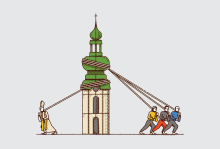
IN OCTOBER LAST year, protesters stood silently in the streets of Kraków and Szczecin in Poland. This gathering was not criticizing the ruling political party. Instead, their banners bore the slogan “We Want the Church Back,” echoing “We Are the Church” movements directed at the Catholic hierarchy by laity around the world.
These Roman Catholics call to account sermons offered by conservative Polish clergy. The clerical leadership is “dividing people and spreading hostility toward others instead of teaching about our merciful God,” the group explained in a petition. Many Catholics in Poland feel homeless because they experience hostility, condemnation, and exclusion from the pulpit. They want to publicly demonstrate that the Catholic Church is larger than priests and bishops; that everyone, regardless of their sexual orientation or minority status, should be able to find a place in the church that calls itself catholic (which means “universal”). Finally, they demand that the priests and bishops not reject Pope Francis’ message and that Catholic social teaching, the church doctrines on human dignity and common good in society, be returned to the mainstream of Catholic life.
A month later in Gdańsk, 150 members of the archdiocese protested the bishops’ negligent handing of sexual abuse cases. They were responding to a study by the conference of bishops released in March that noted nearly 400 cases of Polish priests accused of abuse of minors between 1990 and 2018 and to the release of a documentary, Don’t Tell Anyone, in which priests are confronted by their victims. The hierarchy refused to investigate reported incidents and failed to openly support the victims. Lay Catholics also specifically criticized Gdańsk’s Archbishop Sławoj Leszek Głódź for his lavish lifestyle and confrontational communication style.

Benedict wants his name removed as co-author of a new book on the issue of priestly celibacy.
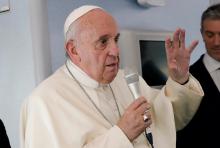
Two years after the Vatican State signed the Treaty on the Prohibition of Nuclear Weapons (currently ratified by 34 countries), he declared during an in-flight press briefing from Japan to Rome, “Not only their use, but also possessing them: because an accident or the madness of some government leader, one person’s madness can destroy humanity.”
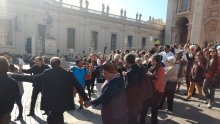
Indigenous women from Amazon basin nations spoke with high-level clergy at the Amazon Synod.
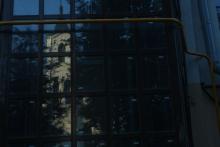
Most everyone I grew up with near Goodman Street in northeast Rochester attended Corpus Christi. A post-Vatican II parish complete with folk group and food pantry to help a neighborhood of mostly single mothers, the church was a rare source of sustenance and light. Still, by the time we hit our twenties, most of us had escaped the urban neighborhood and along with it, left the church. I returned a few years ago — first for Christmas Mass, then to interview a parishioner for a story, and then for no good reason at all. This unmoored me. Even as I sang the Psalm, I surveyed the rows of empty pews.

The document also issues a strong defense for the protection of the environment in the Amazon, deforestation, illegal mining, and development projects that threaten native cultures and the delicate ecosystem vital for the planet.

Some faith-based adoption agencies have a greater ability to adopt antidiscrimination policies than others; nondenominational agencies like Bethany can often change their policies after winning board approval, while Catholic agencies are beholden to Catholic doctrine on same-sex marriage. Due to the structure of the Catholic Church, Catholic adoption agencies would have to shed their Catholic identity to serve LGBTQ couples — something that St. Vincent would likely have had to do.
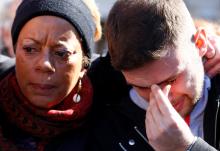
Pope Francis ended his conference on the sexual abuse of children by clergy on Sunday by calling for an "all-out battle" against a crime that should be "erased from the face of the earth." But victims and their advocates expressed deep disappointment, saying Francis had merely repeated old promises and offered few new concrete proposals.

A nun and a woman journalist delivered the toughest criticism of Church leaders heard so far at Pope Francis' sexual abuse conference on Saturday, accusing them of hypocrisy and covering up horrendous crimes against children.
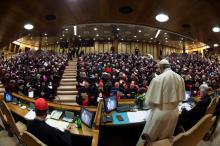
Pope Francis promised that concrete actions against child sexual abuse by priests would result from a conference he opened on Thursday, countering scepticism among survivors who said the meeting looked like a public relations exercise.

He pointed out that this is not a new problem, confirming that the Catholic Church knew about the abuses against nuns even if the public did not.
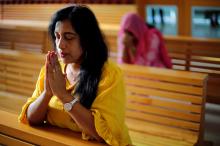
Pope Francis is hoping to persuade a country enmeshed in a regional war that he has condemned to give Catholics more freedom when he becomes the first pontiff to set foot on the Arabian Peninsula.
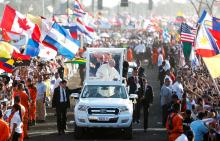
Pope Francis said an open-air Mass before a huge crowd on Sunday to wrap up a jamboree of Catholic youth, the last big event before he returns to Rome to prepare for a historic trip to the Arabian Peninsula in one week.

TIMOTHY BUSCH IS A WEALTHY MAN with big ambitions. His version of the prosperity gospel, Catholic in content and on steroids, is a hybrid of traditionalist pieties wrapped in American-style excess and positioned most conspicuously in service of free market capitalism.
Busch’s organization, the Napa Institute, and its corresponding foundation are among the most prominent of a growing number of right-wing Catholic nonprofits with political motivations. Such groups, some more extreme than others and all on the right to far-right side of the political and ecclesial spectrum, have in recent years muscled in on territory that previously was the largely unchallenged domain of the nation’s powerful Catholic bishops.
What Busch calls “in-your-face Catholicism” is often expressed amid multicourse meals followed by wine and cigar receptions, private cocktail parties for the especially privileged, traditional Catholic devotionals, Mass said in Latin for those so inclined, “patriotic rosary” sessions that include readings from George Washington and Robert E. Lee, and the occasional break for a round of golf.
Busch’s Catholic Right brand of American libertarianism aligns with some far-right leaders based in Italy who oppose Pope Francis and appear interested in joining forces to fashion an alternative to official Catholic leadership structures, which in this country means the U.S. Conference of Catholic Bishops (USCCB).
Last summer, the Napa Institute sponsored a birthday soiree at the Rome residence of Cardinal James Harvey, a far-right American cleric. There, Princess Gloria von Thurn und Taxis, a German philanthropist-turned-conservative Catholic, rubbed shoulders with American arch-traditionalist Cardinal Raymond Burke, who, according to The New York Times , “ate birthday cake in the shape of a red cardinal’s hat, held champagne in one glass and blessed seminarians with the other, and watched fireworks light up the sky in his honor.”
Princess Gloria also introduced German Cardinal Gerhard Ludwig Müller, fired by Pope Francis from his position as the church’s doctrinal watchdog, to Steve Bannon. Bannon subsequently invited Müller to Bannon’s Washington headquarters, better known as the “Breitbart Embassy,” according to The Times. All done under the watchful eye of Timothy Busch.
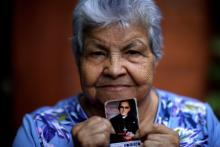
A photo essay from the canonization of Saint Oscar Romero in Vatican City, and of how the faithful in San Salvador prepared in the weeks before.